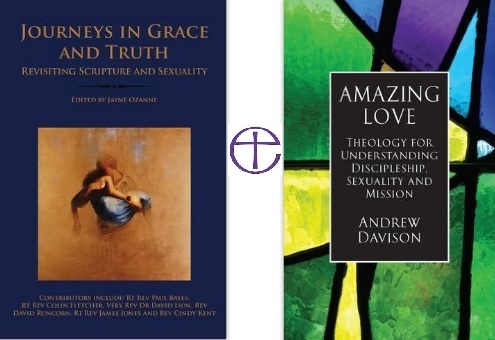The Church Times reports that members of the General Synod of the Church of England are receiving two newly-published books to help them prepare for the Shared Conversations around issues of sexuality at next month’s meeting.
Amazing Love: Theology for understanding discipleship, sexuality and mission, edited by Canon Andrew Davison, the Starbridge Lecturer in Theology and Natural Sciences at the University of Cambridge, was published last week by DLT.
In the same week, senior Evangelical clergy shared their positions on theology and sexuality in a new book edited by Jayne Ozanne, a member of the General Synod. Among them is the Bishop of Liverpool, the Rt Revd Paul Bayes, who writes about being “profoundly changed” by his interaction with the LGBTI community, and his desire to “make room and to extend the table”. …
Journeys in grace and truth: Revisiting scripture and sexuality, published by Ekklesia on behalf of Via Media Publications, features ten essays by Evangelicals. Many call for a shift in the current debate within Evangelical circles, and an end to the dismissal of those who have reached a different conclusion on sexuality.
According to the Church Times review, the Evangelicals’ essays include some very careful language about marriage.
The Very Revd David Ison, the Dean of St Paul’s Cathedral, … describes his journey to the conclusion that it is important that LGBTI people “have access to what I’ve termed ‘the virtues of marriage’”.
Although he is “not convinced that the theology of marriage can be separated from its roots of being between a man and a woman”, he calls for further work on “what ‘marriage’ means in Christian understanding in a very different social context”. His essay warns that “the fruits of our current views and practices have too often been destructive. . . There is a lack of honesty about people’s sexuality or situations. There is inconsistency between public and private policy, which corrupts church life and brings the gospel into disrepute.”
Davison’s book concludes with a word about evangelism in a context where marriage equality is broadly accepted.
It also highlights a recent YouGov survey that found that 93 per cent of unaffiliated 25-35-year-olds believe that same-sex marriage is right.
“Unless there is a really good reason for opposing same-sex relationships — and we don’t believe that there is — we are shooting ourselves in the foot in the worst possible way.” An entire generation is being “lost to Christ”, and to elevate a “hard line” against gay marriage or relationships to the status of the creeds would be “suicidal”.
The Shared Conversations program has been conducting structured, open-ended discussions around sexuality throughout the dioceses of the Church of England since September 2014. A closed-door session after the close of General Synod business next month is designed to allow small groups of General Synod representatives a similarly opportunity. The Church Times reported last week remarks by the organizer of the Shared Conversations program, David Porter, chief of staff to the Archbishop of Canterbury.
Mr Porter said that the approach reflected Jesus’s instruction to those who disagreed: “You go to your brother and talk about it. . . only after that do you take it to the wider Church.” …
“Every major church that has sought to address this issue has fractured in a major way. We have taken a different road to try to ameliorate that: a relational road.” …
Mr Porter has always been frank about the potential for the Church to split. He has expressed fears that as many as 20 per cent of the Church of England may become disaffected and leave (News 30 January, 2015). But on Friday he spoke of the calibre of the “immensely gifted” people facilitating the conversations — Anglicans who have worked in the UN, Cabinet Office and EU — and their track record in “helping all sorts of groups and organisations sit and talk together around deeply difficult things.”
General Synod will meet in York from July 8-12. After the business meetings on Friday and Saturday, Shared Conversations are scheduled Sunday afternoon through Tuesday. A pamphlet offering guidance to those participating concludes with advice “when we cannot reach agreement:
All the dialogue in the world cannot disguise the fact that sometimes we do just disagree about something and no amount of effort can help us to find an answer we can all accept or even a solution we can all live with. What do we do if we find ourselves in dialogue with someone with whom we profoundly disagree?
First, we all need the humility to admit that we might be wrong even when we feel sure we are right.
Secondly, we can remember that in the eyes of God people are always more than their opinions. As Christians we are called to love and respect all, and perhaps especially those with whom we find it hardest to agree.
Thirdly, and most importantly, we can remember that reconciliation is not an optional add-on to the Gospel: it is the heart of the Gospel. We are always called to go the extra mile, and this means trying to be reconciled with others for as long as it takes and despite all provocations and setbacks.
Our experience to date through the RSCs [Regional Shared Conversations] suggests that when we all aspire to these Christian standards this opens up the possibility that, even when we profoundly disagree, the manner of our encounter with each other will uphold the Gospel.
Read more in the Church Times here; find the advice to General Synod participants here.

